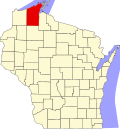The Red Cliff Reservation
The Red Cliff Reservation was created through a series of treaties between the U.S. Government and the Red Cliff Band of Lake Superior Chippewa Indians (Red Cliff Band), the most recent being the treaty of 1854. The reservation is approximately one mile (1.6 km) wide and 14 miles (23 km) long, located at the top of the Bayfield Peninsula, on the shores of Lake Superior in northern Wisconsin.
The community of Red Cliff, the location of tribal offices and businesses, is three miles (4.8 km) north of the city of Bayfield, a popular tourist community adjacent to the Apostle Islands National Lakeshore. [4]
Frog Bay Tribal National Park (FBTNP) is located in Red Cliff. It is the first Tribal National Park in the United States. The original 89-acre parcel of former Red Cliff Reservation land was successfully reacquired in 2012 and a second, 86-acre private parcel was acquired in 2017. This 175-acre area comprises FBTNP and permanently protects a large tract of at-risk boreal forest, the lower estuary and mouth of Frog Creek, and restored former reservation lands back to tribal ownership. [5]
This page is based on this
Wikipedia article Text is available under the
CC BY-SA 4.0 license; additional terms may apply.
Images, videos and audio are available under their respective licenses.





